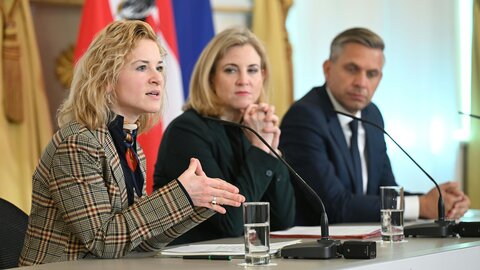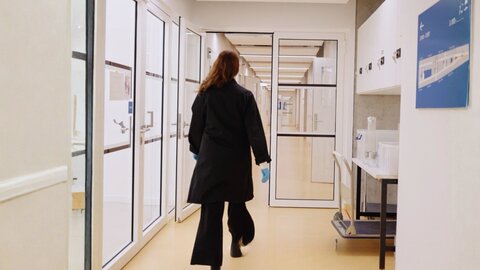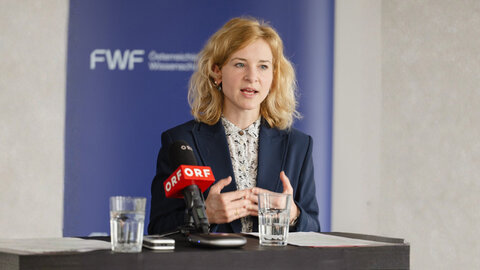FWF Awards €68 Million for Excellent Projects

At their third meeting in 2024, the members of the FWF’s Scientific Board approved 180 basic research projects. These include Austria's most highly endowed research awards – the FWF Wittgenstein Award and the FWF START Awards – as well as 40 international projects which are still awaiting a decision from partner organizations.
Principal Investigator Projects accounted for the largest share. Of a total of 184 applications received, 57 Principal Investigator Projects with a total volume of €25.37 million were approved. This funding will allow many basic research projects to be realized.
New approvals in the 1000 Ideas and #ConnectingMinds programs
After a one-year hiatus, the Scientific Board has again started approving applications to the 1000 Ideas program. With this program, the FWF funds completely new, high-risk, or particularly original research ideas. 250 applications with an application volume of €40.71 million euros were submitted for funding. Of these, 212 proposals with a volume of €35.61 million were reviewed by the international jury in a double-blind process. The final funding decision is made by the members of the FWF Scientific Board. A total of 19 projects at 13 universities and research institutions with a funding volume of €3.25 million were approved and are now being launched in the 1000 Ideas program. One of the projects approved for funding was submitted to the AI Mission Austria and AI Green call.
Four #ConnectingMinds Workshops with funding of of up to €12,000 each were also approved. This funding gives researchers the opportunity to work with non-academic participants to develop and further advance their project idea and the planned research process. The workshops are also the prerequisite for applying for a subsequent #ConnectingMinds Project. The application deadline for the 2nd stage is November 4, 2024.
Successful career advancement programs: ESPRIT, Elise Richter, Erwin Schrödinger
With its ESPRIT career program, the FWF supports highly qualified postdocs from all disciplines, with a particular focus on the advancement of women in research. At the most recent Scientific Board meeting, 47 applications were put up for a decision, and 15 were approved for funding with a total volume of €5.17 million. In the senior postdoc program Elise Richter for outstandingly qualified women in all scientific disciplines, five out of 14 submitted applications were approved, for a total of €2.41 million in funding. Erwin Schrödinger fellowships give postdocs the opportunity to spend career-enhancing stays at renowned research institutions. Of 22 applications, nine Schrödinger grants totaling €1.68 million were approved.
PEEK funds arts-based research in Austria
Eleven applications for the Arts-Based Research (PEEK) program and two for the Elise Richter PEEK program were also handled at the recent Scientific Board meeting; one proposal was approved for each program.
The approved projects are:
- AR 830: “Microtonality in Jazz,” principal investigator: Lars Seniuk, Music and Arts University of the City of Vienna; Zentrum für Wissenschaft und Forschung (PEEK)
- RIC 9676524: “A Cinematic Exploration of Shamanic Practices in Europe,” Pamela Breda, University of Arts Linz (Elise Richter PEEK)
Jiří Friml is the 2024 FWF Wittgenstein Award winner
The June meeting also included the decision on Austria's most highly endowed research awards: Cell biologist Jiří Friml from the Institute of Science and Technology Austria (ISTA) was selected as the 2024 FWF Wittgenstein Award winner by the international START/Wittgenstein jury. With Jiří Friml, the international jury has honored a pioneer in basic research who is investigating previously undiscovered mechanisms of how plants control their growth. His work is extraordinarily groundbreaking and gives us a profound insight into the evolutionary development of the plant world. In his pioneering work, he discovered the universal significance of the hormone auxin in plants.
With the FWF Wittgenstein Award, he and his group at ISTA hope to continue researching very fundamental questions about how plants control their growth, focusing on new approaches combining methods from cell and developmental biology, genetics, biochemistry, and bioinformatics. Jiří Friml was awarded a grant of €1.7 million to further advance his world-class research.
FWF START Awards: €1.2 million each for up-and-coming top researchers
The START/Wittgenstein jury also recommended eight proposals to receive FWF START Awards. The eight funded projects, four of which are led by women, will each receive up to €1.2 million in funding. The FWF START Awards went to Juan P. Aguilera (Institute of Discrete Mathematics and Geometry, TU Wien), Svitlana Antonyuk (Department of Slavic Studies, University of Graz), Dan Batovici (Institute for Medieval Studies, Austrian Academy of Sciences), Uroš Delić (Institute for Quantum Optics and Quantum Information Innsbruck, Austrian Academy of Sciences), Esther Heid (Institute of Materials Chemistry, TU Vienna), Senka Holzer (Department of Internal Medicine, Medical University of Graz), Polina Kameneva (St. Anna Children's Cancer Research Institute), and Yurii Malitskyi (Faculty of Mathematics, University of Vienna).





